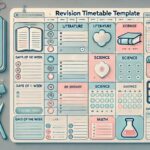Last-Minute GCSE Revision Tips
Are you feeling the pressure of upcoming GCSE exams, but struggling to find the motivation to revise? Don’t worry, you’re not alone. It’s completely normal to feel anxious and overwhelmed during this crucial time. But with just a few weeks left until exam day, it’s essential to make the most of your time and revise effectively. In this blog, I’ll share with you my top tips for last-minute revision that have helped me and countless others to achieve exam success. From time management to memory tricks, we’ll cover everything you need to know to make your revision count. So grab a cup of tea, take a deep breath, and let’s dive in!
Tips for Effective Last-Minute Revision
Now that you understand the importance of effective last-minute revision, let’s dive into some actionable tips to make the most of your time. These tips will help you focus on the most important topics, optimise your study time, and reduce stress during the final stretch before your exams.
Make a plan
Create a revision plan to help you stay on track and focus on the most important topics. Prioritise topics based on their importance and allocate specific time slots to each one. Read here how to create a GCSE revision plan.
Use active learning techniques
Avoid simply reading through your notes or textbook. Instead, use active learning techniques such as creating flashcards, practicing past papers, and summarizing key concepts in your own words. Find your favourite revision technique.
Take breaks
It’s important to take breaks regularly during revision to avoid burnout and improve your concentration. Aim to take a break for at least 10-15 minutes every hour or so.
Get plenty of rest
Sleep is crucial for consolidating memories and improving your concentration. Aim to get at least 7-8 hours of sleep every night, especially during exam season.
Stay hydrated
Drinking plenty of water can help you stay focused and alert. Aim to drink at least 8 glasses of water a day.
Stay positive
it’s important to stay positive and avoid negative self-talk. Instead of focusing on what you don’t know, focus on what you do know and build from there. Remember, you’ve come this far and you’re capable of succeeding! Read how to maintain motivation during GCSEs.
Techniques to Boost Memory Retention

Memory retention is a crucial aspect of effective revision, and there are various techniques you can employ to improve your ability to remember information. In this segment, we will explore some practical strategies that can help you boost your memory retention and make the most of your last-minute revision efforts.
Spaced Repetition
This technique involves revisiting information at specific intervals, rather than cramming it all in at once. By spacing out your revision sessions, you give your brain time to absorb and retain the information more effectively.
Active Recall
This technique involves actively recalling information from memory rather than simply reading over notes. Try to remember and write down key concepts without looking at your notes. This technique has been shown to improve long-term memory retention.
Mnemonic Devices
These are memory aids that help you remember information through association. For example, you can use acronyms or visual imagery to help you remember key facts.
Interleaving
This technique involves mixing up different topics or types of problems during revision. By doing so, you force your brain to make connections between different concepts and improve your overall understanding and retention.
Remember, everyone learns and retains information differently, so it’s important to experiment with different techniques to find what works best for you.
Strategies for Different Types of Subjects
When it comes to last-minute revision, it’s important to remember that different subjects require different strategies. While some subjects require rote memorisation, others require critical thinking and application of concepts.
Science and Maths
Practice – that’s it basically! The best way to understand and retain scientific and mathematical concepts is by solving problems and practicing equations. Also, make sure to review any formulas or scientific principles that you may have trouble remembering. Even if you get the formulae sheets, you need to know how to use them effectively. Here are the GCSE Maths past papers.
History and Social Sciences
Use a mnemonic device to remember important dates, events, and figures. Create acronyms or rhymes to help you memorise key information. Also, try to understand the context behind historical events or social science concepts, rather than just memorising facts. Here are GCSE History past papers.
Language and Literature
Read and write as much as possible. The more you read and write, the more familiar you become with the language and its nuances. Make sure to review any grammar rules or literary devices that you may have trouble remembering. Here are the GCSE English Language and English Literature past papers.
Art and Music
Use visual aids and mnemonic devices to remember important information. Create diagrams, mind maps, or charts to help you visualise concepts. For music, try listening to and analyzing different pieces to improve your understanding of musical theory.
Remember, these are just general strategies and may need to be adapted based on your individual learning style and the specific subject matter you are studying.
Time Management Tips
Managing your time effectively is essential when it comes to last-minute revision. Time can be your friend or your worst enemy, depending on how you use it. Without proper time management skills, you may find yourself scrambling to finish your revision, leaving you feeling stressed and overwhelmed.
- ✅ Make a list of all the topics you need to cover and prioritise them based on their importance and difficulty level. Start with the most crucial ones, and work your way down.
- ✅ Set aside specific times for studying and stick to your schedule as closely as possible. Make sure to include breaks to avoid burnout.
- ✅ Find a quiet study space and remove any distractions, such as your phone or social media notifications.
- ✅ Break your revision sessions into manageable chunks. It’s better to study in short, focused bursts than to cram for hours on end.
- ✅ Instead of just reading notes or textbooks, try using active learning techniques like making flashcards, creating mind maps, or summarising key concepts in your own words.
- ✅ Aim for at least 7-8 hours of sleep each night to help your brain process and retain information more effectively.
Remember, effective time management is essential to effective revision, so take the time to plan your study sessions carefully and stick to your schedule as closely as possible.
Managing Exam Anxiety
As important as it is to study effectively, it’s equally important to manage your stress and anxiety during last-minute revision. After all, you want to perform your best and be in the right frame of mind to recall what you’ve studied.
One effective strategy for managing stress is to take breaks throughout your revision session. Taking a break can help you clear your mind, recharge, and come back to your revision with a fresh perspective. During your break, try to engage in activities that you enjoy, such as going for a walk, listening to music, or reading a book.
Another effective strategy is to practice mindfulness. Mindfulness involves being present in the moment and focusing your attention on your thoughts, feelings, and bodily sensations. Practicing mindfulness can help you manage your stress and anxiety by reducing negative thoughts and emotions.
Finally, remember to take care of your physical health. Eating a balanced diet, staying hydrated, and getting enough sleep can help you manage stress and anxiety, as well as improve your concentration and memory retention.
Remember, it’s natural to feel stressed and anxious during exam season. However, with the right strategies in place, you can manage these emotions effectively and perform at your best on exam day.
To Sum Up
In conclusion, effective last-minute revision requires a combination of various strategies and techniques. It’s important to have a plan, stay focused, manage your time wisely, and take care of your physical and mental health. Remember, you are not alone in this journey, and there are many resources available to help you. Don’t hesitate to reach out to your teachers, peers, or even professional tutors for additional support. And always keep in mind that the most important thing is to do your best and stay positive. With the right mindset and approach, you can achieve your goals and succeed in your GCSE exams.
If you need additional help with last minute revision, Edumentors tutors are there to help. Their tutors have recently completed their GCSEs and are now studying at top UK universities such as Oxford and Cambridge. They understand the challenges and stress of GCSE exams and can provide you with the guidance and support you need to excel. So don’t hesitate to reach out and book a session with one of our experienced tutors today. Good luck and happy revising!







